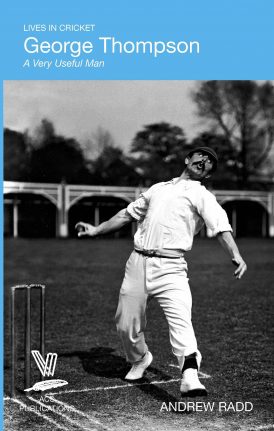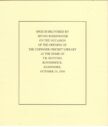George Thompson: A Very Useful Man
Martin Chandler |Published: 2022
Pages: 205
Author: Radd, Andrew
Publisher: ACS
Rating: 4 stars

The Victorian era ended in 1901, so well over a century ago now. People still write biographies of people who were alive then of course, but the absence of anyone who knew the subject inevitably makes the task that much harder.
The name of George Thompson is not a particularly well known one, something I have always found surprising. He may have only played in half a dozen Tests, but he was a fine all-rounder who was instrumental in Northamptonshire progressing so rapidly that, in 1912 after a mere seven years as a First Class county, they finished that summer as runners-up in the Championship.
So I have always been keen to learn more about Thompson, and was delighted when I found out that Andrew Radd was interested in writing this book. I have read Radd’s work before, most notably a fine biography of David Steele that he co-authored three years ago. But The Bank Clerk Who Went to War and many of his contemporaries are still with us, and he remains an immensely popular man. For the reason put forward in my opening paragraph I really wasn’t at all convinced that Thompson would work anything like as well.
The most encouraging aspect of the project was that Radd is a Northamptonshire man through and through. Born in the county town he has spent his entire career in local media, and as long ago as 1993 he co-wrote the history of the county in the Christopher Helm series. He has been the club archivist since 2017, a role which inevitably adds to his credentials. No one could be better qualified to write up Thompson’s life, but would Radd be able to find the material to put together a fully rounded picture of his subject?
The good news is that he could. Despite almost eighty years having passed since Thompson’s death it turns out, doubtless without his actually realising it at the the time, that Radd began his research for the book back in the early 1980s. He did so by interviewing the man who captained Thompson back in 1921, Walter Timms, his subject’s son George junior, as well as a man who had seen Thompson play in his heyday before the Great War.
Thompson had an interesting upbringing. His father was an unlicensed bookmaker, so not the usual background of the middle classes, but a lucrative enough occupation for the Thompson family to be more comfortable than most, and to enable young George to pursue his passion for cricket.
It is remarkable how fully Radd has been able to discover the story of Thompson’s life. Often in these situations old press reports allow a comprehensive reconstruction of a man’s playing career, but not a great deal else. Cricketing biographies inevitably dwell on the game, but without something more can drag.
Without a long Test career there is little about Thompson’s life that is familiar. There was one home Ashes Test, in 1909 without conspicuous success, and Thompson’s other five Test appearances all came in South Africa the following winter in an interesting but poorly chronicled trip by a team some way short of being truly representative. Two non Test tours that Thompson went on were ‘Plum’ Warner’s trip to Australia and New Zealand in 1902/03 and, two years later, with Lord Brackley’s side that travelled to the Caribbean.
Back home Thompson was the backbone of the Northamptonshire side for years. Having only joined the County Championship in 1905 I have always struggled to understand why the story of their remarkable 1912 season has never been told, particularly as that of the previous years title, when Warwickshire finished top under the leadership of a 22 year old Frank Foster is still lauded to this day.
Back then Edgbaston was not a Test match ground, and Warwickshire were decidedly not one of the ‘Big Six’, but they did have five men who had or would go on to play for England. The Northamptonshire story seems to me to be the more remarkable because of their side, and they called upon only twelve men all summer, only Thompson ever played Test cricket. It is a fascinating tale of an underdog almost snatching the biggest prize, well told by Radd and undoubtedly the highlight of the book.
There is however much more to Radd’s book than an account of Thompson’s playing career as there is a good deal on Thompson the man, and plenty of material that puts his life and career in a wider context. Also present is the tale of an interesting ‘comeback’. Thompson’s playing career ended in 1922 when he was 44. That winter he went out to South Africa for a coaching assignment and found himself being asked to umpire in the second and third Tests between Frank Mann’s England and the home side. They were the only two First Class matches in which Thompson ever officiated. On returning home he chose to spend the remainder of his working life in coaching.
George Thompson: A Very Useful Man is an excellent read and will do nothing but enhance the already excellent reputation of the ACS Lives in Cricket series. Radd has not contributed to the series before, but I sincerely hope he will do so again and, if he needs another gentle push, I would suggest he might like to begin with ‘Nobby’ Clark or Vallance Jupp,






I want to buy the book but cannot find out how to do it
Comment by Steve Riches | 11:58am GMT 14 February 2022
https://shop.acscricket.com/?product=george-thompson-a-very-useful-man
Comment by Martin Chandler | 8:37pm GMT 14 February 2022
Minor quibble: Edgbaston had been a Test match ground since 1902.
Comment by AndrewB | 11:30pm GMT 16 February 2022